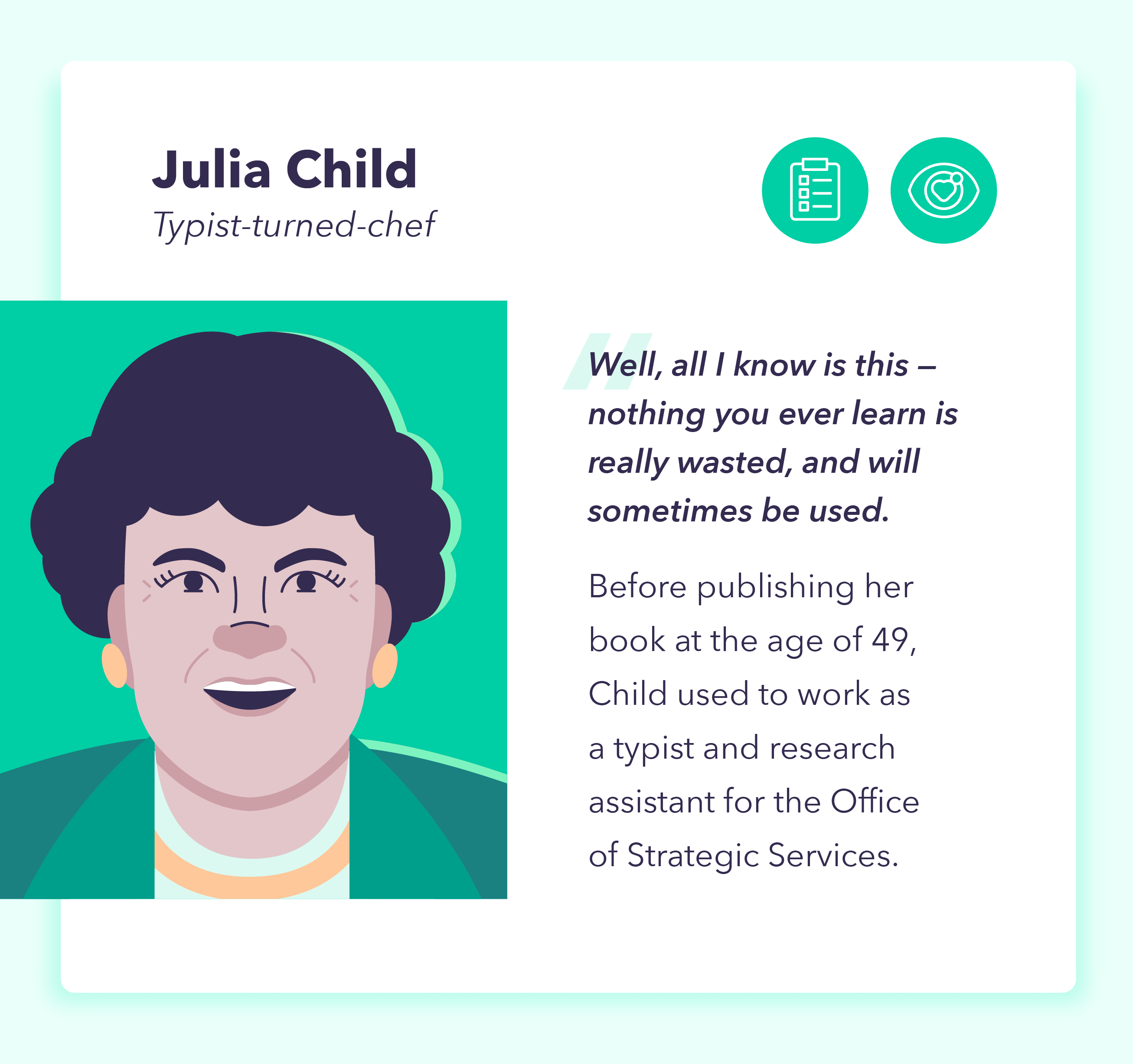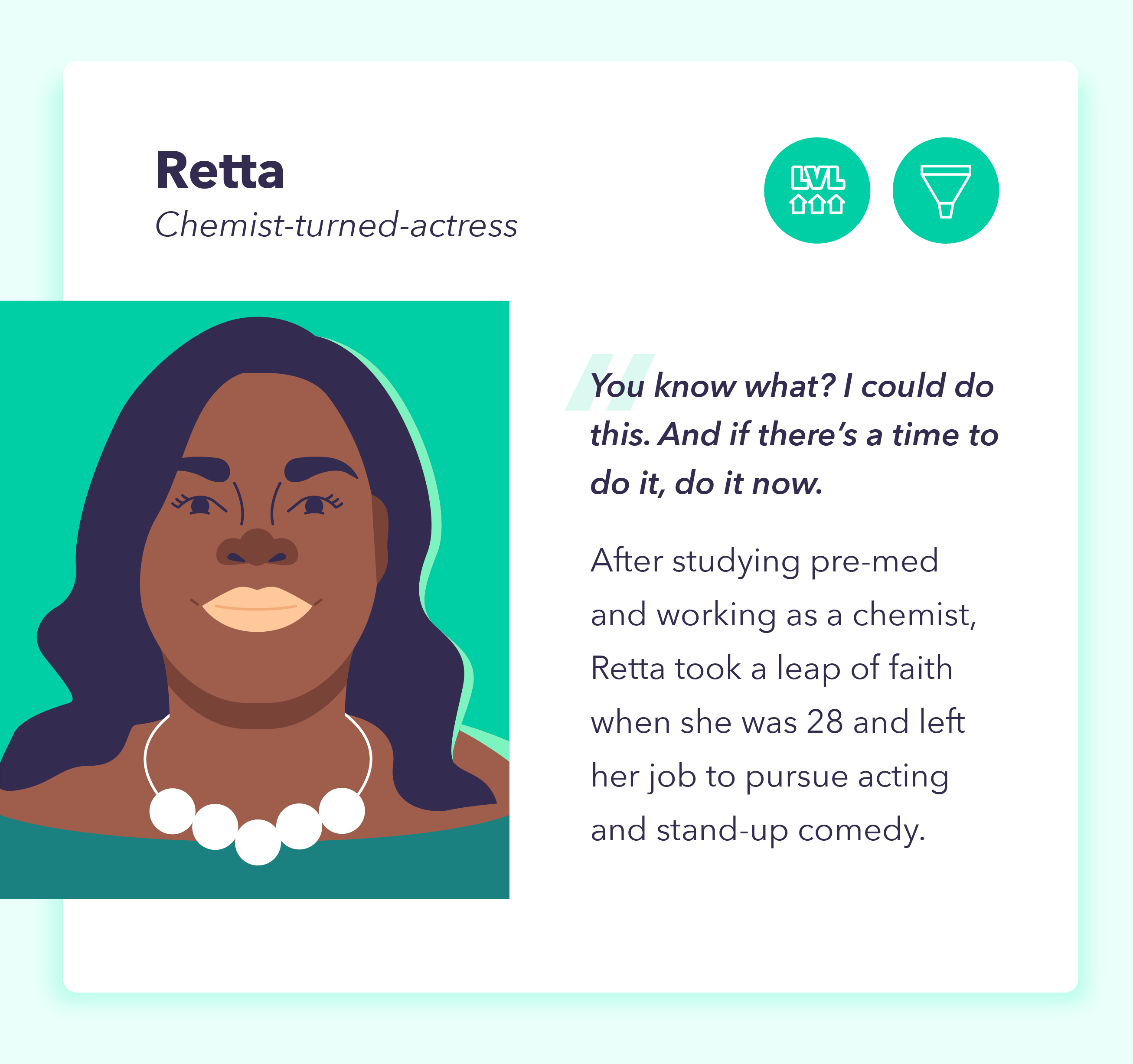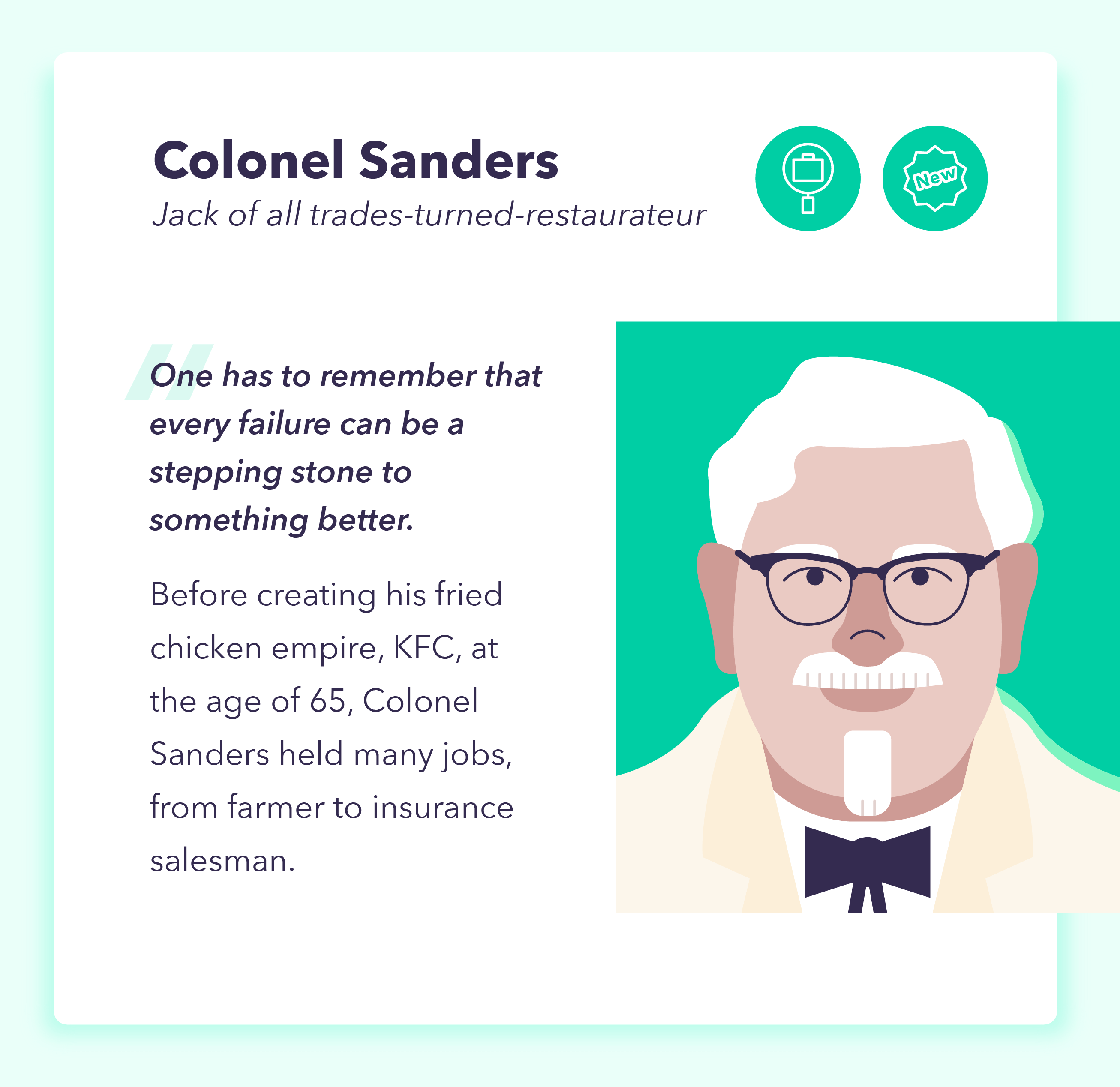You probably had to pick a career field early in life, but what happens if you later realize it’s not right for you? If you’re wondering how to start a new career, either later in life or after trying different jobs, you’re not alone.
In 2021, an increasing number of people started to rethink their careers and long-term goals, leading to the Great Resignation — a 20 percent increase in resignations compared to 2020.
If you’re ready to shift careers, but you’re thinking to yourself, “How do I start a new career at 40?,” we’ll show you just how — no matter what age you might be. In this guide, you will not only learn tips to start a new career in 2022, but you might also come away motivated by some celebrity success stories. From chemists-turned-actors to an ice skater-turned-fashion icon, we’ve got the notables covered.
What Does Starting a New Career Mean?
Starting a new career means changing jobs, whether it is a new role or in a new industry. This is a chance to explore new paths and challenges, or maybe even follow a dream you’ve been keeping in your back pocket for years. Although pursuing a career change might be worrisome, there are many benefits as well.

Being Challenged
Working in the same job for years and feeling unchallenged might mean you need a new career. The challenges that come with a career shift can help you expand your knowledge and learn new skills, try new work environments and tasks, and surround yourself with people from different backgrounds. After all, overcoming a challenge can certainly be gratifying.
Finding a New Purpose
Most of us want to have a purpose in life, especially when it comes to our careers. Changing careers can be a way to find a new purpose in your work, and make you excited to do something new. Having a renewed sense of purpose can also help you feel happy at work and boost your productivity. In fact, studies show that happy workers are 13 percent more productive.
Increasing Your Pay
Larger incomes are associated with greater well-being and overall life satisfaction. Wanting to shift careers can also be an opportunity to get a better salary. You can use your experience and previous salaries to leverage a pay increase when starting a new career.
Finding a Healthier Workplace
Sometimes your work environment might be what will influence you to want to find a different career. An unhealthy work environment can lead to stress, decreased productivity, and feeling burned-out. Even if you work in a healthy workplace, you might not feel like a fit. A career change can help you find a workplace that’s healthier and a better match for you.
Changing Your Schedule
Whether you work a 9-to-5 or have a flexible schedule, starting a new career can also help you find a better fit for your routine. Depending on the career you pick, it’s an opportunity to have more flexible work hours or switch up your usual work schedule.
9 Tips for How to Start a New Career
If you decide you want to break new ground in your career, being prepared ahead of time can help you make that transition smooth. Here are some tips to follow when changing careers.
1. Find Out What Your Interests Are
When looking for a new career, you might start off with some introspection. Consider what you’re interested in and what your natural abilities are, and ask yourself what are some things you would like to change or that you don’t enjoy doing. Writing down your goals and interests can also help you visualize your perfect career.
2. Make a List of Your Experience
Starting a new career will most likely require you to go through the whole process of getting a job. This means you will have to polish your resume to target the new career field. Start by writing down your experience and skills and compare them to the current job market.
3. Learn New Skills
There’s a chance you might not have the skills and experience needed to shift careers, especially if it’s a drastically different field from your current job. With this in mind, if you’re asking yourself, “How do I start a new job with no experience?,” it can be a good idea to allocate some of your time to focus on learning the needed skills.
4. Research Job Options
Research is key to finding new career ventures. Learn more about not only your career field of interest but also similar areas where you can see yourself succeed. Get down to the nitty-gritty and look at job descriptions, company websites, and even current employees’ job experience.
5. Narrow Down Your Options
If you have a long list of possible career fields and job positions, try to narrow it down to a few that seem more aligned with your skills and goals in life. It can be helpful to use a career assessment test or write down a list of pros and cons for the different careers.
6. Try Out a New Career Field
If you have a new career in mind but aren’t sure it will be a fit, you can try it out without too much commitment. Volunteering in the field or shadowing someone in a job position that interests you can be a good way to learn more about different careers and build connections.
7. Be Flexible
Starting a new career can challenge you in different ways, one of which may be your flexibility. Start this process with an open mind and understand that you will likely have to be flexible with your routine, tasks, and even your salary.
8. Network
No matter what field you choose, networking can help you with your career change. Connecting and building relationships with people in a new field can show you what to expect from the job and even lead you to potential employers.
9. Apply for Jobs
Once you’re satisfied with your new career choice and opportunities to come, it’s time to start applying for jobs. Don’t be discouraged because you’re doing a career shift — instead, use your unique experience and fearless nature to communicate your skills and expertise with potential employers.
What to Consider When Starting a New Career
Although following these tips should help set you up for success when learning how to start a new career, there are some things to consider before doing a full career shift.
Career Change Reasons
When looking for a new career, it’s important to identify the reason why you want a career change. Whether it’s because you’re not satisfied with your current work environment or because you want to find career fulfillment, knowing your reasons can help you figure out if it’s the right move for you. Here are some questions to ask yourself before exploring new career ideas:
- Why do you want to change your career?
- Are you feeling tired of your current career?
- What do you want in the future?
- Do you feel you are being compensated appropriately?
- Do you think you’re more qualified for another field?
Financial Plans
Staying financially prepared is especially important when switching jobs. Coming up with a financial plan ahead of time can help you prepare in case you don’t have a job for a period of time while changing careers. Take a look at your savings and incoming expenses and evaluate whether you can go a couple of months without a job, or if it’s better to keep your current one during the process.
Necessary Experience
Just like getting your first job, each career field has its own experience requirements. Evaluate whether you have enough experience to switch careers by researching the field. If not, ask yourself whether you will have enough time to take a specialty course and if you are willing to put in extra hours to learn new skills.
Change of Routine
It’s common to fall into a routine and become adjusted to it. However, one other thing to consider when picking a new career is whether you are willing to change your current routine. A career change might mean different hours, a different commute, and a different sleep schedule, especially if you’re starting a new career that requires working night shifts.
5 Celebrities Who Made Successful Career Changes
You’re not alone when it comes to starting a new career — even if it’s late in life. Many well-known figures have been in that position, too. Just consider these noteworthy celebrities who shifted careers for the better.
1. Julia Child

Is 35 too old to start a new career? Not if you’re the cooking legend Julia Child, who didn’t start her French cuisine ventures until later in life. Before publishing her first cookbook at the age of 49, she used to work as a typist and research assistant in the Office of Strategic Services, which later became the CIA. Her love for cooking started when she moved to Paris years later. This goes to show that it’s never too late to acquire a passion for something.
- How they did it: She found out what her interests were and learned new skills.
2. Giorgio Armani

Giorgio Armani proves to anyone considering starting a new career that you don’t have to stick to your first career choice. Before founding his brand, Armani, Giorgio studied pharmacy in Milan and joined the Army afterward. He was serving at a military hospital when he decided to switch professions and work as a clothing salesperson, which led him to start designing clothes.
- How they did it: He was flexible and tried out a new career field.
3. Retta

If you’re a fan of Retta’s humor, you probably wouldn’t have guessed that she set herself up for a white-collar career by going to medical school. Although she probably didn’t get her acting and stand-up comedy skills from studying for her pre-med classes, Retta took a leap of faith and left her post-college chemistry job to pursue a career in acting. She’s an example that taking on new challenges and believing in yourself can lead you to the career you love.
- How they did it: Learned new skills and narrowed down her options.
4. Colonel Sanders

Colonel Sanders is a great example that taking many different paths in life can still lead you to career success — and some Finger Lickin’ Good fried chicken. Before creating his restaurant empire, KFC, at the age of 65, he switched professions many times. From farmer to insurance salesman and even enlisting in the Army, Colonel Sanders finally found success when he started sharing his delicious chicken recipe.
- How they did it: He researched job options and tried out a new career field.
5. Vera Wang

If you’re worried about a big career shift, take Vera Wang as an example. Before becoming an iconic wedding dress designer, she had her sights set on the Olympics for ice skating. Vera Wang began ice skating as a kid, and competed in national championships. Although she was devastated when she didn’t qualify for the Olympics, her frustration led her to study in Paris, where she found a love for fashion.
- How they did it: She found out what her interests are and tried out a new career field.
If you’ve been wondering how to start a new career, you’re probably not the only one. Going through a career shift can be scary, but following these tips and getting motivated by people who successfully changed careers can get you one step closer to your dream job.

Sources: Ranker | Eat This, Not That! | The Career Changers | Southern Living | Inspiring Quotes | Harvard Business Review | CNBC | Fast Company
This post on TessMore Finance: How to Start a New Career: 9 Career Change Tips for 2022 was also published on MintLife Blog.
MintLife Blog https://ift.tt/3FpKLIB
Comments
Post a Comment
We will appreciate it, if you leave a comment.